Click here to get this article in PDF
Source: Michael Ballanger 12/09/2024
Michael Ballanger of GGM Advisory Inc. shares his thoughts on the current state of the market, looking at Bitcoin, gold, and the potential consequences of Trump’s tariff threats.
“Manifest destiny” was a phrase that represented the belief in the 19th-century United States that American settlers were destined to expand westward across North America and that this belief was both obvious (“manifest”) and certain (“destiny”). It was a marvelous method of unifying the various competing factions across the United States in the decades that followed the American Civil War (1861-1865). It also became the clarion call justifying the confiscation of land held by First Nations Tribes for thousands of years.
America “From Sea to Shining Sea” was always the fear of Canadians after watching how the fledgling young republic snatched away land during the Mexican-American War previously controlled by Mexico that included present-day Texas, California, Nevada, and Utah as well as parts of present-day Arizona, Colorado, New Mexico, and Wyoming. This was considered to be the natural birthright for the American republic, and only because Americans were wary of taking on the mighty British Navy did they refrain from attempting to revisit their northern neighbors after the disastrous outcome of the War of 1812 became an early days of Vietnam. In fact, many of the techniques used in that war by the First Nations tribes (Algonquin and Six Nations) fighting for the British were similar in scope and devastation to the techniques used by the Viet Cong in the 1960s.
In 2015, Donald Trump ran a successful campaign against “Crooked Hillary” by promising the American voters a long list of outrageous “improvements,” including a gargantuan wall along the southern border that “the Mexicans will PAY for” in order to “Make America Great Again.” When he left office in January 2021, there was no wall, and outside of tax cuts that threw the entire concept of a balanced budget completely out the window, very few of those mouth-breathing promises were ever kept. However, in those four years, government was carried out the way it should be: quietly and with little to discuss.
I had a mentor in my early years who always prayed for the Canadian elections to result in a “minority government” — where the winners of the election represented a minority of the voting members in the “House of Commons.” The theory remains to this day that the Prime Minister must play ball with the other parties in order to avoid a “non-confidence vote,” the result of which is an immediate call for an election and the fall of the ruling party as leaders. In this manner, natural safeguards against out-of-control political opportunists are in place. Where it goes wonky is when you have majority governments with a narcissistic megalomaniac at the helm or a coalition between the ruling party and one or more of the minority parties that engage in backroom deal-making (as is the case today in Canada) that can deliver up some of the worst government performances in history.
The U.S. has always had decent government when the House and the Senate had different majorities, which was not the case from January 2017 to January 2019 when Republicans held the hammer. This is a squandered opportunity to effect change, but this time, Trump is not repeating the errors committed in 2015 when he underestimated the need to fill his cabinet posts quickly and decisively. This time, he is moving with rapier-like accuracy and efficiency, but all the CNBC commentators can talk about is the appointment of crypto-friendly businessman Paul Atkins to the position of SEC Chairman. For at least the next two years, Republican majorities in the Senate and Congress will give the Republican White House carte blanche in the legislative arena, paving the way for tax cuts and tariffs and essentially anything “the Donald” deems as worthwhile. So, the markets may soon, after Inauguration Day, discover that they are in a “Be careful what you wish for” moment where sweeping changes strike fear and confusion into investor attitudes.
Now, the week prior to this appointment, Trump was quoted as saying that “any country that joins the BRICS group trying to replace the U.S. dollar as the world’s reserve currency will be subject to a 100% tariff.” So, if he is overtly hostile to the notion of a new vehicle replacing the mighty U.S. dollar, why does he appoint a new SEC chairman favorable to a brand new asset class created and marketed for the expressed purpose of replacing the U.S. dollar?
One of the brightest presidents in recent history was also one of the most reviled, and that man was Richard M. Nixon. If you take out Watergate, which was more a case of staff mismanagement rather than outright innate corruption, this was the first Western leader to open up talks with “Red China” in an effort to create an Eastern Front that would drain Russian resources in their focus on the Iron Curtain separating the Soviet Union from Europe and the Middle East. He extracted the U.S. military from an unwinnable war in Vietnam, and it is generally underreported that he was one of the most popular presidents in U.S. history prior to Watergate.
I was once in a watering hole in downtown St. Louis that we called “J&A’s Bar,” run by a couple of retired St. Louis beat cops (that allowed underaged Canadian hockey players to have a beer un-harassed by former fellow officers) when an older gentleman considered a “regular” by the bosses took me aside and told me an incredible story.
Anyone who has seen Mickey Rourke in the brilliant movie “Barfly” will attest to the behavior of the classic drunk seated at the bar telling story after story, always entertaining and rarely without a drink as people fill up his tumbler just to hear the rest of the story.
This older gentleman pulled me aside after listening to me wax on eloquently about how the death of JFK “dented the American psyche forever, never to be repaired again.” He had a look of menace and mayhem in his eyes as he sat me down and demanded another “pinta beer and shot of Wild Turkey” and then proceeded to explain that the only reason that JFK was elected in 1960 was the incredible power of Boston crime boss Joseph Kennedy who made promises through his Irish Mafia connection and Chicago Mayor Richard M. Daley to tilt the votes in the South Side to the Kennedy side.
He further explained that the promises made to the crime lords did not include turning his pit bull RFK on to the task of “reining in” those bosses.” The grizzled old barfly turned and looked at me with deeply bloodshot eyes and said, “and we all know now what happened in November ’63” after which a streaker bolted from the unisex bathroom and out the door into the balmy St. Louis July evening to the dismayed remarks of another elderly female regular that exhorted “Damn! All I could see was hair!”
Donald Trump loves dearly to shock the world with bombastic pronouncements and over-the-top, media-grabbing comments that are designed to command leverage in what he sees as an upcoming deal. The problem as it relates to investment policy is that I simply cannot make investments based upon the mega-maniacal whims of a policy influencer (as opposed to a policy maker) who has consistently failed to deliver on his promises.
While you all are well aware of my contempt for politicians of all stripes and colors, there is nothing that irks me more than politicians who think they can manage outcomes without paying due attention to inputs. Imposing a 25% tariff on one of your largest trading partners (Mexico) and 100% tariffs on all BRIC nations, as well as a 60% tariff on your largest trading partner (China), reminds me of the Smoot-Hawley Tariff Act of 1930, a move designed to protect American agriculture and manufacturing by imposing tariffs on over 20,000 different products.
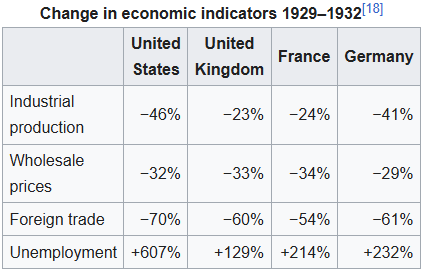
Triggering retaliation from other trading partners around the globe, it is generally considered one of the major contributors to the Great Depression (1929-1939) that saw industrial production drop 46% from 1929-1932 but even more disastrous was the 607% increase in unemployment in the same time frame while foreign trade declined 70%.
If all of the “tough talk” by the President-elect is just a negotiating tool designed to bluster-bomb” the world into pro-U.S. submission, then perhaps the bark may be far worse than the bite that crippled the world in 1930 with Smoot-Hawley. However, if Trump decides that he wants to use his final term in office by leaving an indelible mark on global trade, the steps he has laid out in campaign rhetoric will not be bull market-friendly.
In the interim, all one can do is pray that the threats being thrown about by President-elect Trump these days are actually the attention-seeking antics of a man hunted and harassed by opponents for the better part of the last four years. The mainstream media led by CNN have been throwing op-ed Molotov cocktails at him while the heavily biased Department of Justice has done their utmost to keep him from being re-elected since the day he left office in January 2020. In another six weeks, it will be payback time, and you can bet that DJT has been taking names.
Manifest Destiny, indeed. . .
Bitcoin
The big news this week was the majestic ascent of Bitcoin to its lofty all-time high above the magic $100,000 level, a feat that was reported over and over and over on every business news channel in the world.
It seems to me that for the first few years after its invention in 2008, the mainstream media, prompted and paid for by their Wall Street masters, frowned upon the cryptocurrencies (especially Bitcoin), with the late Charlie Munger quote being, “It’s like somebody else trading turd,s and you decide I can’t be left out.”
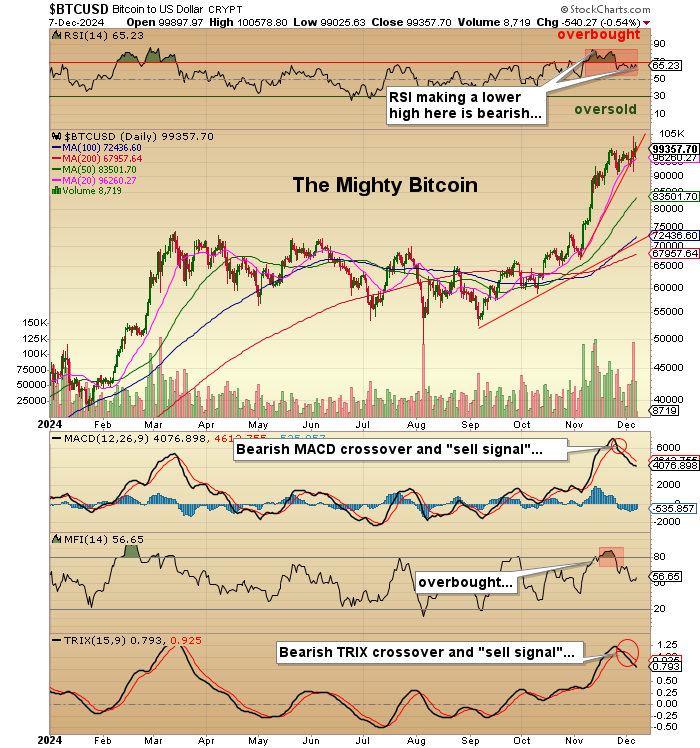
JP Morgan CEO Jamie Dimon called it “a fraud” and “a Ponzi scheme” up until January 2024, when I suspect he noticed that trading revenues for his firm included significant contributions from one of the crypto ETFs they underwrote. He vowed to never again discuss Bitcoin on CNBC or anywhere else, choosing instead to call it “a pet rock.“
It is the same old story that repeats itself endlessly with the Wall Street crowd. Wall Street hated the entire concept of the internet in the very early stages until they saw people scrambling to buy modems and then once corporate finance smelled money, they could not get enough of it. Even the Fast Money gang on CNBC are now trading it with public spats and catcalls flying around with the bulls buying it as a “momentum play” and the timid bears too afraid to criticize it for fear of looking unintelligent.
As I wrote to subscribers this week, I have no right to make even the slightest commentary on Bitcoin because I have never owned it and certainly never shorted it. I wrote about it in 2017, the first time the price approached $20,000, and suggested that if they ever let it trade on a traditional exchange, the game would be over because the Wall Street pros would short it into oblivion. It then proceeded to crash from $19,870 to $3,380 in under a year after regulators allowed a Bitcoin futures vehicle to begin trading. And the pros did exactly what I said they would.
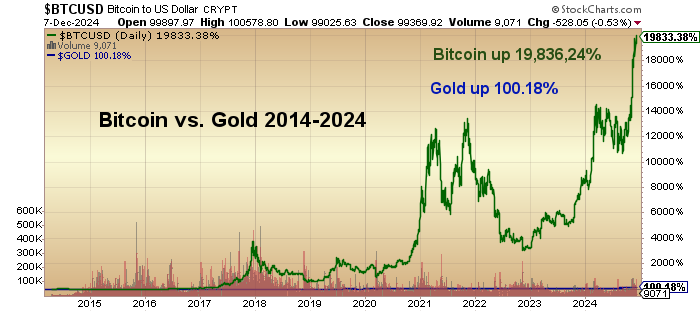
Do I regret maintaining my bullheaded bias toward an “asset class” that has no real value, as in no utility, no cash flow, no earnings other than what people are willing to pay for it, and no basis in value?
The answer is “absolutely.” Nothing would have made me happier than to have elected to protect the purchasing power of my savings back in 2014 using Bitcoin instead of gold. Back in 2014, I was lamenting the fact that we had been in a protracted bear market in gold since the top in August 2011, which made us feel as though we had been in the dentist’s chair for a three-year root canal without Novocain. However, I was proceeding on the premise that the hundreds of billions of dollars spent to rescue the banking industry in 2009-2009 would eventually lead to massive inflation and higher gold prices.
Being witness to the Great Inflation of the 1970s, I took my lead from gold’s ascent from $35 in 1971 to $857 by 1979 as profligate money printing took its toll. What slipped by under my radar screen was that all the while I was waiting for the new generation of investors to jettison cannabis and technology for gold and silver, those kiddies had actually created their own private “gold” by way of technology.
Disguising it as an internet-scale “invention,” they promoted it as the only way to avoid being in the banking system and, therefore, out of the reach of those big, bad, bullion bank behemoths that could and would manipulate prices irreverently to their corporate benefit and to the debilitating demise of the small gold holders and mining stock investors.
Purists like this author never dreamed that an entire generation of fuzzy-cheeked basement dwellers largely self-trained in the art of online trading would flock in the millions to an idea rather than an actual “hard asset.” What I had been trained to believe was the only “asset class” that could ever truly protect one’s savings from the ravages of government-engineered inflation, and currency debasement had five thousand years of human history as proof of utility for the yellow metal.
Why, if you dropped a bar of it on your foot, you learned the true meaning of the term “hard asset.” Alas, as was the demise of buggy whips, mimeographs, and fax machines, for an entire generation of novice investors, there arrived a new and far “cooler” method of insulating one’s savings from certain purchasing power depletion and one that could be stored on your cellular telephone. You did not need an intermediary such as a “financial advisor” or “wealth manager” to execute your trades. All you would ever need was an internet signal and a phone charge,r and you were solidly in business and far “hipper” than your parents or grandparents, constantly struggling to remember where they wrote down the combinations for their floor-to-ceiling safe that housed all of their gold and silver coins, bracelets, certificates, and girlie mags too risqué for even mother to see.
It is a new era, and my thoughts on Bitcoin can only be relegated to the world of rudimentary technical analysis. While 45 years of trading all sorts of financial assets have taught me well, there is really no other method of analyzing Bitcoin other than by its price action, which has been nothing short of stupendous in the past ten years. As the chart above conveys, Bitcoin was and is egregiously overbought by all measures. With RSI registering a lower high in the move above $100k than it displayed during the ten trading days after the election when it traded north of 70 every day for two weeks, it could not even get over 70 last week after Trump made Atkins the new SEC czar. However, the one graphic that always haunts me when I look at bull markets the world over is when the trend moves from “gradual” (as in a nice 45° ascent) to “vertical” (90-100° ascent), and that is precisely what we have seen in Bitcoin since November 5.
I told subscribers that I would avoid Bitcoin “like a swim in the Don River,” arguably one of the filthiest rivers in the country and probably the continent. What cannot be disputed is the long-term uptrend and, more importantly, that it is here to stay because it has captured the hearts and minds of two and possibly three new demographics around the world. Not only has Bitcoin served its purpose as a protector of wealth, but it has also done so far more efficiently and effectively than either gold or silver. As we all know, money gravitates to locations where it is best treated.
End of story.
Gold / GLD:US
I have stayed away from trying to trade gold and instead elected to simply hold my core positions until after the end-of-year rebalancing and window-dressing have run their courses. I have the distinct impression that all of the hedges owned pre-election (at least the ones that are left) are going to be thrown enthusiastically overboard by December 30th this year, with the bulk of the selling to climax by just before Christmas.
With the S&P 500 and the NASDAQ enjoying superlative performances in 2024, there isn’t a portfolio manager on the planet who wants to be seen with a stack-load of sub-performing gold miners on his books. The same applies to underperforming stocks of any ilk and temper; they will all need to be plumbing the depths of the nearest harbourfront by the time the year-end statements go out, which will be mid-January for everywhere except Canada, whose Liberal-NDP carbon tax government failed to avoid a postal strike and shutdown.
No Christmas or Hannukah cards in any mailbox this year, so Canucks will have to settle on a nice warm E-card instead. Once the housecleaning has been completed and the portfolios have had all brands of lipstick painted on their porcine backsides, the gold and silver markets might be ready for a turn. Seasonality favours a better environment right up until the end of February and if 2016 is the guidepost for 2024, the lows for gold back then were around mid-December followed by a ten-month advance.
As for the technical picture, GLD:US is hugging the declining 20-dma after being rejected by the gap zone created the day after the election results came out that lies in the $250-252 area. I wrote about this gap a few weeks back, suggesting that any rally would need to fill that gap before a decent bullish set-up could be accessed, but the gap was only barely touched before the sellers took it straight back down to $242.95, where it went out Friday night.
After spiking to 90 at the end of November, the gold-to-silver ratio sits at 84.2, and while it has been dropping (which is positive) during the week, to get really enamored of the SLV:US trade, I would prefer to see it in the 70’s and dropping fast indicating that silver’s price action is telegraphing a turn. I see that happening in the latter half of the month, so unless there is a sharp drop in the GSR before then, I will remain on the sidelines looking for a better entry point.
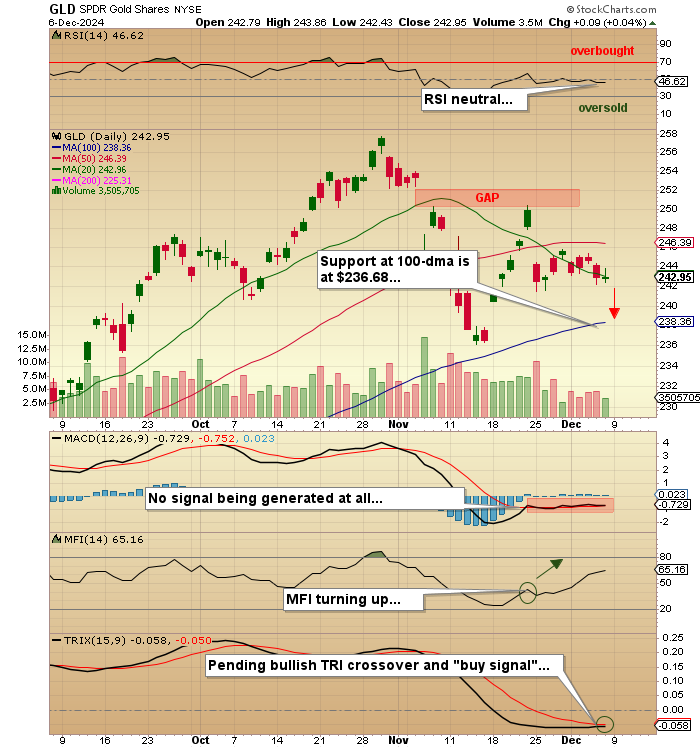
Stocks
Subscribers were notified of a trading idea on Wednesday so I will repeat the section here in the weekly missive for all the world to consider.
December is typically stronger during the first week of trading, with increased volatility during the second and third weeks as mutual fund distributions and rebalancing bring in selling pressure. This year, with the S&P 500 up 26.84% YTD, the rebalancing could be particularly impactful due to the presence of these monolithic generalist funds that adhere to the 60% equities / 40% bonds portfolio structure.
These funds represent trillions of dollars and include pension funds, sovereign wealth funds, and hedge funds that are all now sitting on portfolios that are more like 80% equities / 20% bonds due to the superior performance of stocks relative to bonds since October. In fact, since the Fed slashed the Fed Funds rate by fifty basis points on September 18, the yield on the 10-year. U.S. Treasury bond has jumped 67 basis points or 0.67%. The 20-yr. U.S. bond ETF (TLT:US) goes into the rebalancing period down 2.4% YTD versus the 26.84% increase in the S&P 500, setting up a relatively large amount of equity that might need to be moved to bonds.
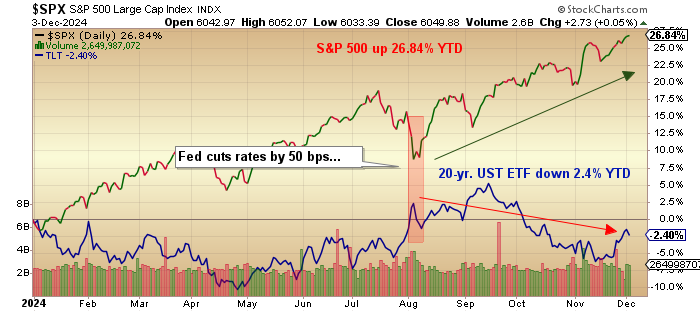
If a 60-40 portfolio manager was managing a billion dollars last January, the $600 million allocated to equities is now worth $761 million, while the $400 million allocated to bonds is now worth $390.4 million. The total portfolio goes into year-end with a value of $1.1514 billion, and therefore, to be properly rebalanced, he needs to trim the equity portion down to $690.8 million and increase the bond portion to $460.6 million.
If you take the percentage of equity that will need to be sold as part of the 2024 rebalancing effort, it is 21% of all stocks held in the portfolio. Multiplying that by the trillions of dollars globally all following the S&P and all using the 60-40 portfolio approach, that is a mammoth amount of selling pressure in a market already egregiously overvalued and approaching outright “overbought.”
Strategy
Using the upcoming rebalancing period as a premise for action, I am going to be long the TLT:US by Friday and short the SPY:US by way of call options on the former and put options on the latter. I am assuming that most portfolios are tracking the S&P but I might also split the put options between the SPY:US and the QQQ:US in order to be short more technology, given its stellar performance in 2024.
For those subscribers that do not use options, you can use the SDS:US (ProShares Ultra Short S&P 500 (ARCA)) or the SQQQ:US (ProShares Trust (NSD) as proxies for puts.
In the GGMA 2024 Trading Account:
- Buy 50 calls TLT January $90 at $4.00
- Buy 50 puts SPY January $600 at 6.00 and/or 50 puts QQQ January $510 at $6.50
For non-options traders:
- Buy 500 TLT:US at $92.50
- Buy 1,000 SDS:US at $18.75 and/or 1,000 SQQQ:US at $30
This trade should feel the full force of the rebalancing efforts by December 20, which is 16 days away. For those leery of being short stocks into year-end due to the incredible momentum displayed each and every session since the big Fed rate cut in September, then just use the TLT:US on the assumption that a huge amount of money currently in equities will be shifted to bonds and that will certainly drive yields lower and bond prices higher.
Sign up for our FREE newsletter at: www.streetwisereports.com/get-news
Important Disclosures:
- Michael Ballanger: I, or members of my immediate household or family, own securities of: All. I determined which companies would be included in this article based on my research and understanding of the sector.
- Statements and opinions expressed are the opinions of the author and not of Streetwise Reports, Street Smart, or their officers. The author is wholly responsible for the accuracy of the statements. Streetwise Reports was not paid by the author to publish or syndicate this article. Streetwise Reports requires contributing authors to disclose any shareholdings in, or economic relationships with, companies that they write about. Any disclosures from the author can be found below. Streetwise Reports relies upon the authors to accurately provide this information and Streetwise Reports has no means of verifying its accuracy.
- This article does not constitute investment advice and is not a solicitation for any investment. Streetwise Reports does not render general or specific investment advice and the information on Streetwise Reports should not be considered a recommendation to buy or sell any security. Each reader is encouraged to consult with his or her personal financial adviser and perform their own comprehensive investment research. By opening this page, each reader accepts and agrees to Streetwise Reports’ terms of use and full legal disclaimer. Streetwise Reports does not endorse or recommend the business, products, services or securities of any company.
For additional disclosures, please click here.
Michael Ballanger Disclosures
This letter makes no guarantee or warranty on the accuracy or completeness of the data provided. Nothing contained herein is intended or shall be deemed to be investment advice, implied or otherwise. This letter represents my views and replicates trades that I am making but nothing more than that. Always consult your registered advisor to assist you with your investments. I accept no liability for any loss arising from the use of the data contained on this letter. Options and junior mining stocks contain a high level of risk that may result in the loss of part or all invested capital and therefore are suitable for experienced and professional investors and traders only. One should be familiar with the risks involved in junior mining and options trading and we recommend consulting a financial adviser if you feel you do not understand the risks involved.
